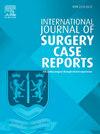Radical nephrectomy for retroperitoneal fibrosis: Case report
IF 0.6
Q4 SURGERY
引用次数: 0
Abstract
Introduction and importance
Retroperitoneal fibrosis is a proliferative disease of fibroblasts with a still unclear appearance and low incidence. The clinical manifestations are nonspecific and appear late, pain is the most common symptom present. Elevated serum IgG4 levels are observed in up to 60 % of the patients and the main goal of treating this condition is to preserve kidney function.
Case presentation
We present a case of an asymptomatic 34-year-old man. A poorly defined mass in the pre-aortic, pre-caval and right rim regions with possible malignancy was observed. After 3 biopsies, it was treated as low-grade follicular lymphoma with chemotherapy. With new growth after 1 year, right radical nephrectomy was performed to resect the lesion. Pathology showed that it was advanced retroperitoneal fibrosis with negative IgG4.
Clinical discussion
RPF usually presents as an irregular mass of periaortic tissue that frequently has malignancy as a risk factor and may be associated with high levels of IgG4. Most of the time, the disease is asymptomatic. When the patient presents symptoms, pain is the most common, although late. Its diagnosis is made by imaging and histopathological exams. Treatment varies according to the progression of the disease, but aims to try to preserve renal function.
Conclusion
RPF is a disease characterized by the accumulation of fibroblasts in the abdominal region with an etiology that has not yet been fully discovered, which can present in several ways, generally identified by imaging exams and can be treated individually depending on the invasiveness of the disease.
腹膜后纤维化的根治性肾切除术:病例报告
导言和重要性腹膜后纤维化是一种成纤维细胞增生性疾病,外观尚不明确,发病率较低。临床表现无特异性,出现较晚,疼痛是最常见的症状。多达 60% 的患者会出现血清 IgG4 水平升高,治疗这种疾病的主要目的是保护肾功能。在主动脉前、腔前和右侧边缘区域观察到一个界限不清的肿块,可能是恶性肿瘤。经过 3 次活检后,医生将其作为低级别滤泡性淋巴瘤进行化疗。1 年后,由于肿瘤再次增大,患者接受了右肾根治术,切除了病灶。病理结果显示,这是一种晚期腹膜后纤维化,IgG4呈阴性。临床讨论腹膜后纤维化通常表现为腹主动脉周围组织的不规则肿块,恶性肿瘤是其常见的危险因素,可能与高水平的IgG4有关。该病多数情况下无症状。当患者出现症状时,疼痛是最常见的症状,尽管出现较晚。诊断需要通过影像学和组织病理学检查。结语肾脏纤维化是一种以腹部成纤维细胞聚集为特征的疾病,其病因尚未完全查明,可有多种表现形式,一般通过影像学检查确定,并可根据疾病的侵袭性进行个体化治疗。
本文章由计算机程序翻译,如有差异,请以英文原文为准。
求助全文
约1分钟内获得全文
求助全文
来源期刊
CiteScore
1.10
自引率
0.00%
发文量
1116
审稿时长
46 days

 求助内容:
求助内容: 应助结果提醒方式:
应助结果提醒方式:


